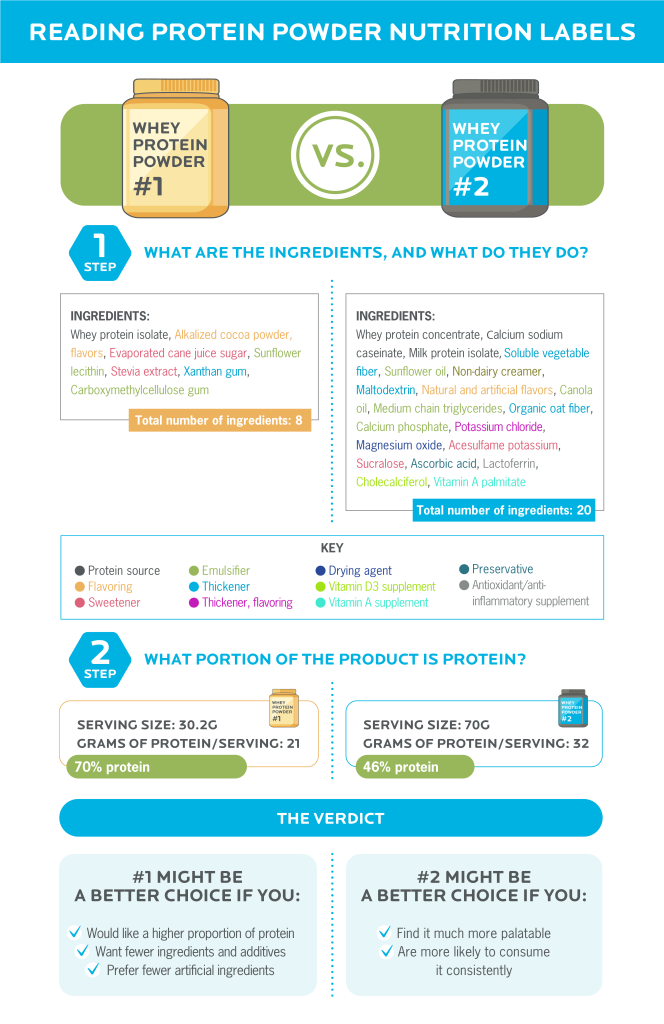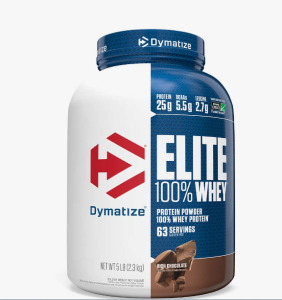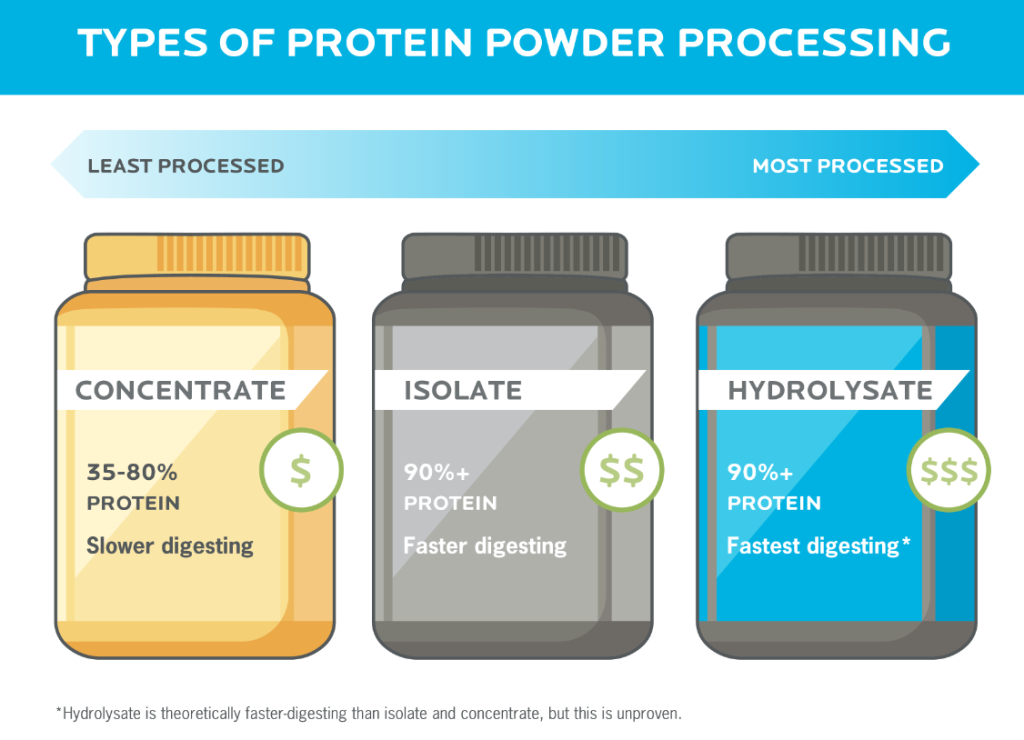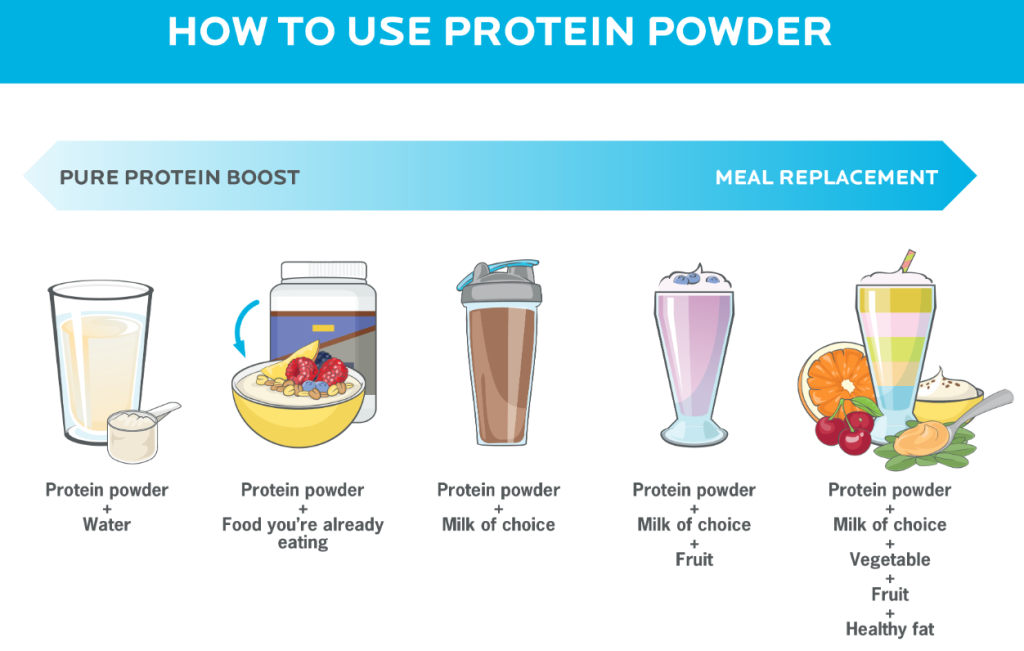How to check if Protein powder is best quality
Checking the quality of a protein powder involves evaluating several factors to ensure that you’re getting a product that meets your nutritional needs and safety standards. Here are some steps you can take to assess the quality of a protein powder:
- Check the Ingredients List: Look for a protein powder with a short and straightforward ingredients list. Ideally, the primary ingredient should be the protein source (e.g., whey protein isolate, pea protein, soy protein isolate), and there should be minimal additives, sweeteners, and artificial flavors.
- Protein Source: Different protein sources have different amino acid profiles and absorption rates. Choose a protein source that aligns with your dietary preferences and goals. Common options include whey, casein, egg white, pea, rice, and soy protein.
- Protein Content: Check the protein content per serving. High-quality protein powders typically contain around 20-30 grams of protein per serving. Be cautious of products that claim unrealistically high protein content, as this could indicate protein spiking or poor quality.
- Amino Acid Profile: Look for a protein powder with a complete amino acid profile. A balanced array of amino acids supports muscle recovery and growth. Some protein powders provide this information on the label.
- Third-Party Testing and Certifications: Look for protein powders that have been third-party tested for quality, purity, and potency. Certifications from organizations like NSF International, Informed-Choice, or USP indicate that the product has been tested for contaminants and accurate labeling.
- Avoid Fillers and Additives: Avoid products with excessive fillers, artificial flavors, colors, and sweeteners. These additives can negatively impact the overall quality and nutritional value of the product.
- Texture and Mixability: Good-quality protein powders usually mix well in both water and other liquids, leaving minimal clumps or grittiness. They also tend to have a smooth texture when mixed.
- Reviews and Reputation: Look for reviews and feedback from other consumers who have used the same protein powder. Online retailers, fitness forums, and social media can be good sources of information.
- Nutritional Information: Review the nutritional label to ensure that the product aligns with your dietary goals. Check the calorie content, macronutrient breakdown, and any potential allergens.
- Price Point: While price is not always an indicator of quality, extremely cheap protein powders may be of lower quality or have hidden drawbacks. It’s worth investing in a reputable product to ensure you’re getting the desired benefits.
- Packaging and Brand Reputation: Choose products from reputable and established brands with a history of producing high-quality supplements. Check the packaging for contact information, manufacturing location, and customer support details.
- Expiration Date and Storage: Make sure the product has a clear expiration date. Properly store your protein powder in a cool, dry place to maintain its quality over time.

List of Quality Protein Powder Brand
here are many great protein powder brands on the market, but here are a few of the top-rated ones:
Optimum Nutrition Gold Standard 100% Whey Protein Powder:
This is a popular choice for many people, and it’s made with whey protein isolate, which is one of the purest forms of protein. It’s also low in carbs and fat, and it comes in a variety of flavors.

Dymatize Elite 100% Whey Protein Powder:
This protein powder is also made with whey protein isolate, and it’s a good option for people who are looking for a high-quality protein powder with few added ingredients.

Orgain Organic Protein Powder:
This protein powder is made with organic whey protein isolate and organic brown rice protein, and it’s a good choice for people who are looking for a protein powder that’s both healthy and delicious.

Myprotein Impact Whey Protein Powder:
This protein powder is a good value for the price, and it’s made with whey protein concentrate, which is a less processed form of whey protein than whey protein isolate.

Quest Protein Powder:
This protein powder is low in carbs and calories, and it’s a good choice for people who are on a keto or low-carb diet.

Vega Sport Protein & Greens
This is another plant-based protein powder that is also vegan and gluten-free. It is made from a blend of pea, hemp, and brown rice protein, and it also contains greens and probiotics.

Types of Protein Powder Processing

Protein powders are dietary supplements that provide a concentrated source of protein, which is essential for muscle growth, repair, and overall health. These powders are often derived from various protein-rich sources, such as whey, casein, soy, pea, rice, and more. The processing methods used to create these protein powders can influence their nutritional profile, solubility, taste, and overall quality. Here are some common types of protein powder processing:
- Whey Protein Isolate (WPI): Whey protein isolate is one of the most popular types of protein powder. It is processed to remove most of the fat and carbohydrates, leaving a higher percentage of protein. The processing involves microfiltration and ultrafiltration to separate whey from other components. This results in a protein powder with a high protein content (usually around 90% or more) and minimal lactose.
- Whey Protein Concentrate (WPC): Whey protein concentrate is processed to have a lower protein content compared to isolate, typically around 70-80%. It retains more of the natural nutrients and bioactive compounds present in whey, which may offer additional health benefits. WPC usually contains slightly more carbohydrates and fats than WPI.
- Whey Protein Hydrolysate (WPH): Whey protein hydrolysate is pre-digested, meaning it has undergone partial hydrolysis to break down proteins into smaller peptides. This process can make the protein easier to digest and absorb. WPH is often used in medical protein supplements and infant formulas due to its hypoallergenic properties.
- Casein Protein: Casein protein is derived from milk and is known for its slow digestion rate, providing a sustained release of amino acids. The curdling process is used to separate casein from milk, and further processing involves filtration and drying to create a powder. Casein protein can be a good option for nighttime consumption or prolonged periods without food.
- Soy Protein: Soy protein is made from soybeans and is suitable for vegetarians and vegans. The soybeans are cleaned, dehulled, and processed to remove fats and carbohydrates. The resulting soy protein concentrate or isolate can be used in various food products and protein supplements.
- Pea Protein: Pea protein is derived from yellow peas and is also suitable for vegetarians and vegans. The peas are ground into a flour, and the protein is extracted through a separation process. Pea protein isolate is a popular choice for individuals with allergies to dairy or soy.
- Rice Protein: Rice protein is made by isolating protein from brown rice. The rice is treated with enzymes to break down carbohydrates and fats, leaving behind a protein-rich powder. Rice protein is often used as a hypoallergenic and plant-based alternative to dairy and soy proteins.
- Blends: Many protein powders on the market are actually blends of different protein sources. These blends can offer a combination of fast-acting and slow-acting proteins, providing a more balanced release of amino acids over time.
- Flavoring and Sweetening: After the protein extraction process, flavors, sweeteners, and sometimes thickeners or stabilizers may be added to improve taste and texture.

Top Protein powder Branch in India
- Optimum Nutrition: Optimum Nutrition (ON) is a globally recognized brand known for its high-quality protein supplements, particularly whey protein isolates. They offer a range of flavors and types to suit different preferences.
- Dymatize Nutrition: Dymatize is another respected brand offering a variety of protein powders, including whey isolates and blends. They are known for their quality and taste options.
- Ultimate Nutrition: Ultimate Nutrition has been a staple in the Indian supplement market for a while. They offer a range of protein products, including whey protein concentrates and isolates.
- MyProtein: MyProtein is a popular brand that has gained a strong presence in the Indian market. They offer a wide range of protein supplements, including whey protein, vegan options, and more.
- MuscleTech: MuscleTech is known for its research-driven approach to supplement development. They offer various protein powders that cater to different goals and preferences.
- BSN: BSN offers a range of protein supplements and is known for its innovative products. Their Syntha-6 protein powder, for example, is a popular choice.
- MuscleBlaze: MuscleBlaze is an Indian brand that has gained popularity for its protein supplements. They offer various protein sources, including whey and plant-based options.
- HealthKart: HealthKart is another Indian brand that offers a variety of protein powders. They cater to different dietary preferences and goals.
- GNC: GNC is a well-known global supplement retailer with a presence in India. They offer a range of protein supplements under their own brand.
- Rule 1 Proteins: While not as widely known as some of the others, Rule 1 Proteins offers high-quality protein powders with a focus on transparency and minimal ingredients.
Why you should consume Protein Powder?
There are many reasons why you might want to consume protein powder. Here are some of the most common:
- To build muscle: Protein is essential for muscle growth and repair. If you are trying to build muscle, you need to consume more protein than you would if you were not exercising. Protein powder can be a convenient and easy way to add extra protein to your diet.
- To lose weight: Protein can help you feel full and satisfied, which can help you eat less calories overall. Protein powder can also help you preserve muscle mass during weight loss.
- To improve your recovery: Protein helps your body repair and rebuild muscle tissue after exercise. If you are active, protein powder can help you recover faster and get back to your workouts sooner.
- To meet your daily protein needs: If you are not able to get enough protein from your diet, protein powder can help you meet your daily protein needs. This is especially important for people who are vegetarian or vegan, or who have difficulty digesting protein from animal sources.
- To improve your diet: Protein powder can be a convenient and easy way to add more protein to your diet. This can be helpful if you are trying to improve your overall diet.

What is the best time to consume Protein Powder?
Here are some specific times when you might want to consider consuming protein powder:
- After a workout: Protein helps your body repair and rebuild muscle tissue after exercise. Drinking a protein shake within 30 minutes of working out can help maximize muscle growth.
- In the morning: Protein can help you feel full and satisfied, which can help you eat less calories throughout the day. Having a protein shake for breakfast can help you stay on track with your calorie goals.
- As a snack: Protein can help you stave off hunger between meals. Having a protein shake as a snack can help you avoid unhealthy snacking.
- Before bed: Protein can help your body build muscle while you sleep. Drinking a protein shake before bed can help you maximize muscle growth overnight.

What is best protein powder for diabetics
- Whey Protein Isolate (WPI): Whey protein isolate is often recommended for diabetics due to its high protein content and minimal carbohydrates. It has a low lactose content and is absorbed relatively quickly by the body.
- Whey Protein Hydrolysate (WPH): Whey protein hydrolysate is pre-digested, making it easier for the body to absorb. It usually has a minimal impact on blood sugar levels and can be a good choice for diabetics.
- Pea Protein: Pea protein is plant-based, low in carbohydrates, and rich in protein. It has a moderate glycemic index and is considered a good option for diabetics.
- Rice Protein: Rice protein is another plant-based option that is low in carbohydrates and may be suitable for diabetics. It’s important to choose a product that doesn’t contain added sugars or artificial additives.
- Soy Protein: Soy protein, derived from soybeans, can also be a suitable option for diabetics. Opt for products with minimal added sugars and avoid highly processed soy products.
- Egg White Protein: Egg white protein is a natural source of protein and has minimal carbohydrates. It’s often considered a good option for diabetics as it doesn’t significantly affect blood sugar levels.
When choosing a protein powder for diabetes, keep these considerations in mind:
- Carbohydrate Content: Select protein powders with low carbohydrate content, as carbohydrates can impact blood sugar levels. Pay attention to the nutrition label and choose options with minimal added sugars.
- Fiber Content: Protein powders with higher fiber content can help stabilize blood sugar levels. Look for naturally occurring fiber rather than added fibers or sugars.
- Quality: Opt for protein powders with minimal additives, artificial flavors, and sweeteners. High-quality products with fewer ingredients are generally better choices.
- Consult a Healthcare Professional: It’s important to consult with a healthcare professional or a registered dietitian before making any changes to your diet, especially if you have diabetes. They can provide personalized advice based on your health status and nutritional needs.

